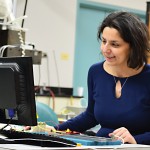Two UIC engineering faculty receive NSF CAREER Awards
Two young faculty scholars in civil and materials engineering at the University of Illinois at Chicago are recipients of Faculty Early Career Development awards from the National Science Foundation. The prestigious awards provide support to junior faculty who exemplify the role of teacher-scholars through the integration of education and research.
Didem Ozevin and Sybil Derrible, assistant professors in the UIC College of Engineering, will each receive a $500,000 NSF CAREER grant to fund their research for five years.
Ozevin is looking for ways to design bridges and other critical structures that incorporate integrated damage-detection capability.
“This will result in a safer and more resilient infrastructure, as new construction and retrofitting incorporates these designs,” she said.
Ozevin says that even when cracks are monitored using the latest techniques, structures can fail without sufficient warning. Her research aims to transform structural engineering by detecting damage at the earliest stage, using an acoustic-based damage-detection method that exploits the regular spacing found in structural elements.
“Existing structures exhibit some localized periodicity, such as perforated beams, and equally-spaced bolts in steel connections,” she said. The spacing is designed to distribute stress, but such a structure can be “tuned” to behave as an acoustic meta-material, in which any new cracks will alter the propagating waves.”Once the periodicity is modified by damage, the elastic wave spectrum will change, and the structural damage can easily be detected as a disturbance of the normal resonant frequencies,” Ozevin said.
The educational components of Ozevin’s grant will include revising undergraduate courses to introduce damage-detection concepts; developing Honors College research projects; introducing high school and undergraduate students into research; and developing a mentoring program for female civil engineering students.
Ozevin received bachelor’s and master’s degrees in civil engineering from Bogazici University in Turkey and her doctorate in civil and environmental engineering from Lehigh University.
Derrible, who is a research assistant professor in UIC’s Institute of Environmental Science and Policy and director of the Complex and Sustainable Urban Networks Lab at UIC, will use his NSF CAREER grant to study how location and lifestyle determine energy and resource consumption. The research “will directly assist in the development of effective policies for more sustainable communities that consume less energy and resources,” he said.
Derrible studies urban metabolism, or the flow of material and energy in cities.
“Urban metabolism follows distinct mathematical laws at the community scale that can be captured using elements of complexity theory,” he said. He will use mathematical laws and agent-based modeling techniques to generate a theoretical space that will include every possible community profile of energy and resource consumption. The laws will be tested for fit to actual communities using data from municipal open-data portals.
A better understanding of urban metabolism will enable planners and engineers to design smarter and more resilient infrastructure systems, Derrible said. But not all of his projects are aimed at professionals. For the general public, he plans to develop a smartphone application that will enable anyone to calculate their daily carbon footprint and track their improvement.
Originally from St. Pierre and Miquelon, a French-owned territory off the south coast of Newfoundland, Derrible received a master’s degree in mechanical engineering from Imperial College in London and his doctorate in civil engineering from the University of Toronto. He came to UIC in 2012 after spending a year in Singapore as a research fellow at the Singapore-MIT Alliance for Research and Technology.
Categories


